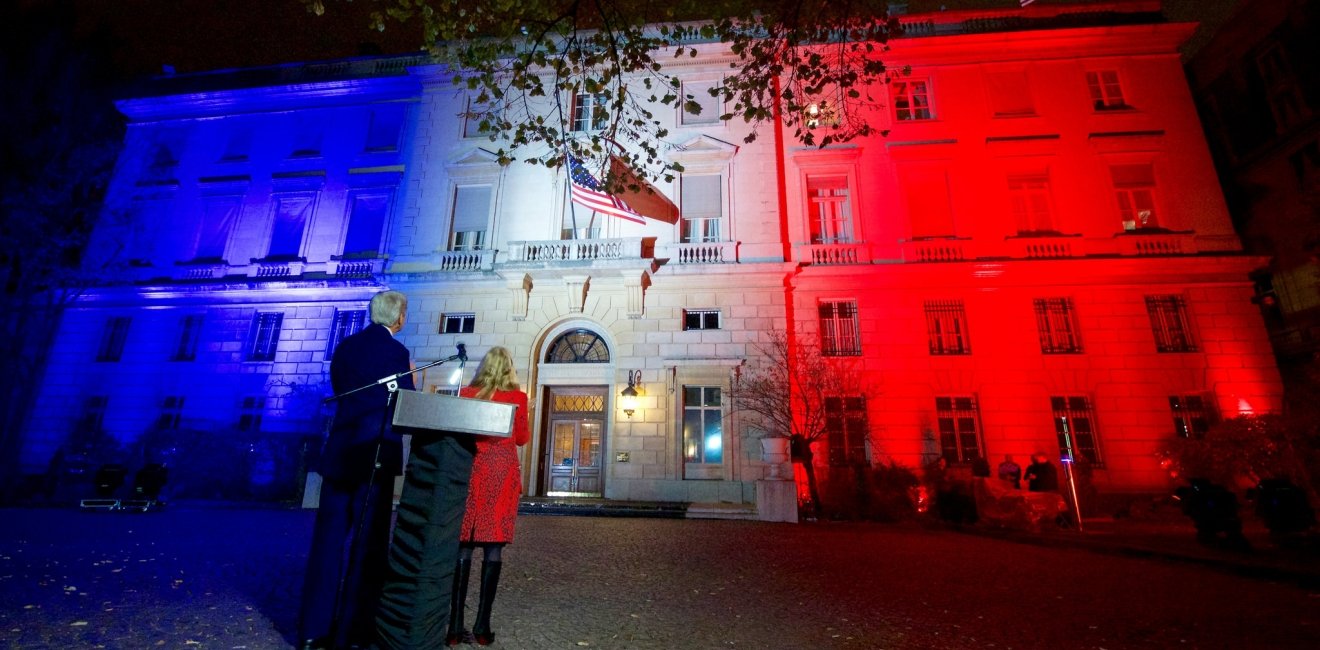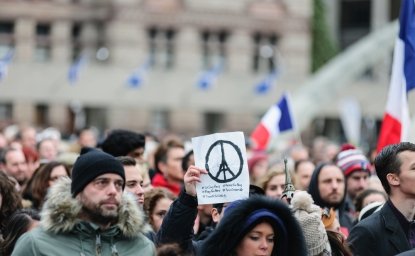After Paris: An American Strategy
A well-considered U.S. response to the Paris attacks demands a coordinated intelligence, financial, and military strategy for countering the Islamic State.
A well-considered U.S. response to the Paris attacks demands a coordinated intelligence, financial, and military strategy for countering the Islamic State.

When terror struck Paris, conventional wisdom went out the window. For months, the Islamic State of Iraq and the Levant (ISIL) had focused on building its “caliphate” in the Middle East. For months, analysts said that the main threat to the West was the lone wolf: the loner radicalized in his basement, armed with a handgun or a steak knife. Then a deadly cell, trained in Syria and directed by a Belgian operative, made its move. They used Kalishnikovs, suicide belts, and false passports. They left behind 129 bodies, including a 23-year-old American named Nohemi Gonzalez. A new video says that Washington is next.
For fifteen months, American warplanes have been dropping smart bombs on the radical Islamist group. Debate on our strategy has been shallow. Now, after Paris, we face a test.
Our response must be three-dimensional. What have we learned about countering these catastrophic plots since September 11, 2001? What can we do to respond today? And what are the holes in our long-term strategy—our narrative for the day after tomorrow?
In the years since the Twin Towers fell, the United States learned an important lesson the hard way: when you sacrifice the rule of law, you feed terrorists B-roll.
In the years since the Twin Towers fell, the United States learned an important lesson the hard way: when you sacrifice the rule of law, you feed terrorists B-roll. The detention facility at Guantanamo is still a key talking point for terror groups around the world. Prisoners in black hoods and orange jumpsuits are a regular feature in ISIL propaganda.
Already, there are troubling signs that France will overreach. A prolonged state of emergency and new, warrantless police powers risk playing into ISIL’s hands, while alienating Muslim citizens the government badly needs to build trust with. American officials must challenge President François Hollande to respond with smarts—not just strength. By the same token, we must swat down suggestions that the United States should shut out Syrian refugees or admit only Christians. That proposal is as unconstitutional as it is dumb.
Since 9/11, the United States has also learned the importance of decisive action. The world is at war with both an army—which holds territory in Iraq and Syria—and an idea, spread across the globe. ISIL is under growing military pressure on its home turf, but so far, the West has fumbled the message war. After Paris, we need to step up and seize the narrative. As I have argued before, part of that means upgrading our communications department: using the best tech tools to blunt their recruitment, while leveraging defectors, responsible imams, and moderate Muslims. But there is no substitute for implementing clear policies as soon as possible. I would urge President Obama to take three key steps: surge intelligence assets to Europe; crack down further on terrorist financing; and use air power and Special Forces more strategically to build an effective Sunni fighting force on the ground.
We won’t know for some time if signs were missed before the Paris attacks. Still, it is clear that Europe lacks the intelligence resources to track thousands of foreign fighters and vet massive refugee flows. Britain recently announced plans to hire more spies over the next several years, but the problem is on Europe’s doorstep today. The United States is sending the FBI, but more is needed. Obama should immediately detail intelligence assets to France, Belgium, and other key allies in the crosshairs of radical Islamists.
Next, strangle their finances. ISIL runs on oil, antiquities, and illicit drugs. As a number of reports have documented, a shocking range of buyers—some of them in the West—are willing to ignore the group’s atrocities in search of a good deal on the black or gray market. That has to end now. The Treasury Department’s Office of Foreign Assets Control has enormous leverage over anyone who wants access to the international financial system. It should shut out—and shut down—ISIL’s customers.
Finally, the White House needs to use air power more strategically. Right now, no force on the ground can clear and hold the territory that ISIL has seized. The Sunni populations whose help we badly need feel marginalized in Iraq; some of their best fighters are now with ISIL. Sunni ranks are also splintered in Syria, where few think that U.S. support is dependable. While we cannot pull a capable partner out of a hat, we can support the emergence of a more effective Arab force by providing more air support, establishing safe zones for refugees, and deploying special operators to provide both targeting and training. That would empower Sunni communities—the boots on the ground we need.
These three steps are tactical measures; I believe they would be effective. But the long game depends on those in the region stepping up to offer effective, inclusive governance. The diplomacy underway in Vienna can work, but only with local buy-in. Nothing else will tamp down the civil war between Sunni and Shia spreading across the Middle East.
The United States has dodged a conversation on strategy for too long. For more than a year, we have been engaged in combat operations against ISIL. It took the president six months to ask permission to wage war. Nine more months have passed without Congress moving on either Obama’s draft Authorization for Use of Military Force (AUMF) or an alternative. In the meantime, the “boots on the ground” debate offers cold comfort to the family of Master Sgt. Joshua Wheeler, who on October 23 became the first American killed in direct combat with ISIL. We will spend more U.S. blood and treasure before this is done.
A debate on a new AUMF would educate the public on those costs. It would give Congress a voice in shaping a long-overdue strategy. And it would demonstrate America’s resolve to both our allies and ISIL.
It’s a year late.
The opinions expressed here are solely those of the author.




